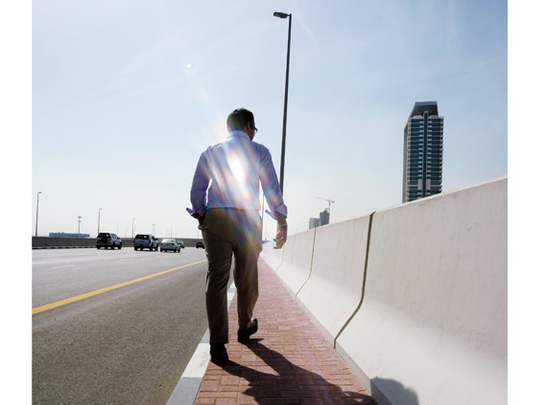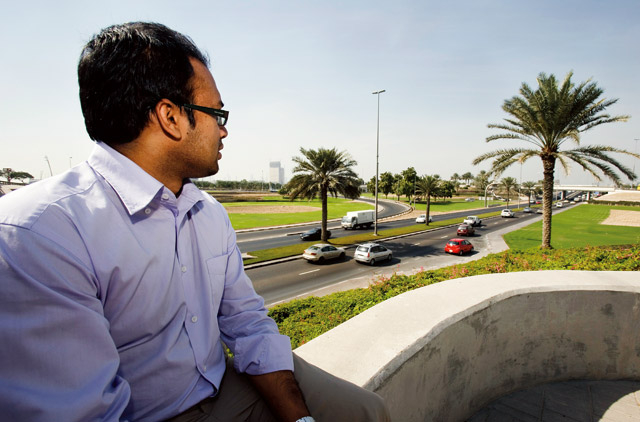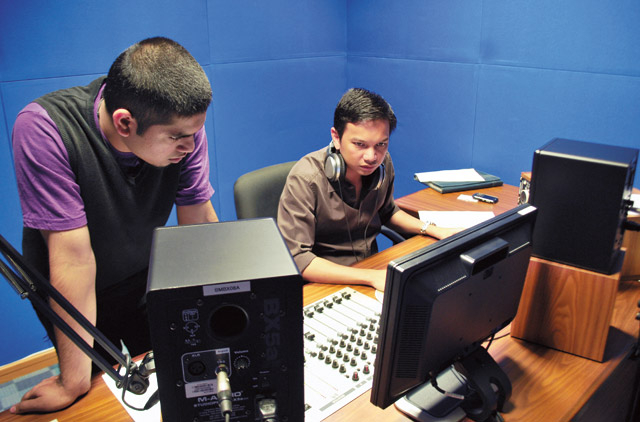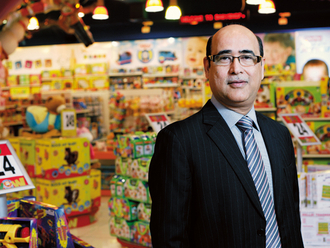
It was March 2009 and Suraya was just four months away from her 23rd birthday. A student of Preston University in Ajman, she was doing a degree in fashion design and was on her way from Ras Al Khaimah on the E1 highway in her car when disaster struck.
Her car was involved in a crash. So severe was the impact, that she died from her injuries.
Suraya's brother Mohammad Shahnawaz, can never forget the day.
"It was horrifying," he says, recalling the death of his only sister, adding that it could have perhaps been avoided if only everybody took a little more care on the roads. A Canada-based UAE expat, originally from Bangladesh, Shahnawaz decided to do something so the number of road fatalities could be reduced.
"I was determined to let something positive come out of this tragic story," he says.
As a first step he decided to join hands with like-minded individuals and launched the Suraya Foundation, in his sister's memory, which aims to prevent road accidents by making motorists aware of the need to be alert and careful, and most importantly, responsible individuals, when they are behind the wheel.
According to a survey earlier this year (January 4, 2011) by the Roadway Transportation and Traffic Safety Research Centre (RTTSRC), road crashes and injuries cost the UAE as much as Dh20 billion annually. Car crashes result in an average of 2.7 fatalities per day.
The good news is the number of fatalities is dropping. Dubai Police's annual report indicates fatalities have decreased by about 32 per cent in 2009 (compared to the previous year) with 225 road fatalities reported. The number fell to 153 during 2010.
According to the World Health Organisation, 3,000 people die on the world's roads every day and several million are injured or disabled each year. Road accidents cost governments about $600 billion, a figure that is equivalent to the combined GDP of almost all the developing countries in the world.
Spreading the message
One of the efforts the Suraya Foundation has made is to come up with different campaigns, including its most recent one, "Are You Reckless?" which aims, through a series of hard-hitting radio commercials in Arabic, Hindi and English, to force drivers and motorists to question whether they are driving safely.
"Our wish is to make the roads in the UAE absolutely safe, and one way to do that is to appeal to drivers, through appealing to their psyche. These advertisements all focus on real-life emotional situations. For instance, there is one of a couple talking to each other on their mobile phones. As the husband asks about their kids, there is a ear-splitting screech and the sound of a car crash.
"The point we are trying to make is to educate drivers about the dangers of using mobile phones while driving," says Shahnawaz.
He adds that the funds to produce an advertisement will come from donations, which can be submitted through the foundation's website. Contributions to the cause have so far included creative work to the tune of $4,500 (Dh16,500) from the Dubai advertising firm METAphrenie, which created the Safe Driving Oath poster, another initiative that has also found a place on the Foundation's website.
"The Safe Driving Oath is a pledge to become a safe driver and follow some basic road rules including wearing seat belts, checking tyres for wear and tear, driving at a safe speed, not driving under the influence, not using a cellphone [even hands-free sets cause reaction time, so avoid them altogether], always yielding to pedestrians, always driving only the vehicle you are authorised to or have a licence for, always having an ICE (In Case of Emergency number stored in your phone to notify loved ones) and always knowing how to react in emergencies [by dialling 999 and learning a little about CPR if possible]," Shahnawaz says.
Another initiative the Foundation has carried out is to collate some 40 hours worth of research data on road accidents in the region. This infographic is also on the Suraya Foundation website.
Shahnawaz says a sustained ad blitz and effort is needed to change attitudes towards safe driving. The infographics tell people what the impact of road accidents have been on the governments and economies of the places where they occur.
He has a like-minded team of people from different walks of life, who are on the board of governors. Called Road Safety Ambassadors or ‘Changers' of the Suraya Foundation, they contribute their different skill sets to make a difference in road and driving attitudes.
The ambassadors include Sappho Rodriguez, a designer with Venture Communications, and Valencio Cardoso who works as an interactive designer with TBWA Dubai.
There is also a Board of Advisors, Julie Hall, an influential English athlete, Karin Kloosterman, blogger, eco activist, and Dr Kamal Soi, who has a doctorate in road safety management and traffic, and is also the President of Raahat - The Safe Community Foundation.
Collecting the evidence
Their first step towards setting up the foundation was collating research about road accidents and how it was affecting the region. Shahnawaz drew inspiration and ideas from Stanford University professors Chip and Dan Heath's book Made To Stick: Why Some Ideas Survive and Others Die, and Switch: How To Change Things When Change Is Hard, also by the same authors.
He decided to launch the foundation in June 2010, primarily with the website as the base. A small group of friends and colleagues in the UAE and Toronto, worked on summing up the differences in standards of driving in countries such as Canada for instance, and this region.
He also brought in companies such as METAphrenie, and Murdoch University Dubai, whose students have enthusiastically helped record the radio campaigns.
Shahnawaz says that this is a lifelong task, but is now anxious to get back to his career, which he has put on hold, since the death of his sister.
"I wanted to get some kind of closure [on the incident]... and I wanted to feel certain two years along the way that I would not regret not having done anything about it... I was struck by the fact that this generation is losing so much....losing themselves to road accidents," he says.
Shahnawaz is an engineer, with a keen interest in management. He worked for an engineering company, prior to launching his own retail business. However, everything has now been put on hold, a situation which he says does not bode well with his parents, whom he says, would like to see him move on.
"I eventually want to start a management company of my own, where there would be no hierarchical divisions, and where each person is accountable for enhancing production in his domain. This is going to be the organisational structure of the future," he says.
Although it is too early to gauge the impact of his efforts just yet, as the radio campaign is still to be launched (some finishing touches still need to be carried out), Shahnawaz hopes that peer pressure, and social networking initiatives, including the Suraya Foundation's Facebook and Twitter interface will allow people to stay updated on safe driving methods and the dangerous reality of road accidents today.
Another initiative he is planning, in collaboration with Aramex, is eye-catching stickers, advocating the safety message, which will be pasted on the company's vehicles.
Shahnawaz has also mobilised illustrator Rayden Kasumos' talents in caricature, to create two comic strips that promote road safety.
The going may have been difficult so far, but Shahnawaz resolves not to quit.
Join ANM's Click! campaign
www.facebook.com/ClickCampaign
Beginning next week, Adam Kechil, a former UK government driving standards agency examiner and a TV and radio personality in Dubai who actively promotes road safety programmes, will be writing an exclusive fortnightly column in Friday.
Inside info
Those interested in supporting the initiative in some way can log onto http://www.surayafoundation.com/index.html, or follow the foundation's work on Facebook http://www.protectbypreventing.com/, or tweet about these initiatives on twitter http://twitter.com/surayaFound
Making a difference
- Who: Mohammed Shahnawaz, a Canada-based UAE expat, originally from Bangladesh
- What: The Suraya Foundation, in memory of his sister who was a victim of a road accident.
- Where: Dubai.
- How: By generating awareness through dedicated media campaigns and through its website http://www.surayafoundation.com/, interactions with schools and colleges, and social networks such as Facebook and Twitter.
Tell us the story…
Do you know of an individual, a group of people, a company or an organization that is striving hard to make this world a better place? Emails us at friday@gulfnews.com or the pages editor at araj@gulfnews.com
Follow Suraya on
http://www.protectbypreventing.com/ http://twitter.com/surayaFound













